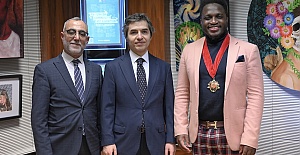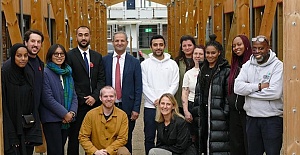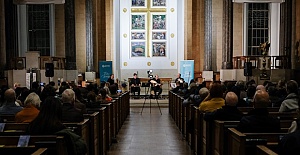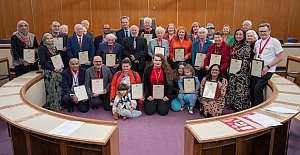THE ancient city of Homs is situated near the Orontes River at the eastern end of Syria’s only natural gateway from the Mediterranean coast to the interior. It occupies the site of ancient Emesa, which contained a great temple to the sun god El Gebal (Aramaic; Latin: Elagabalus; Greek: Heliogabalus). Emesa was ruled by a line of priest-kings throughout the Roman Empire, and two of its nobility rose to become emperor, Elagabalus and Severus Alexander. Aurelian (reigned 270–275 ce) made the town his headquarters and there defeated Queen Zenobia of Palmyra. It was taken in 636 by the Muslims, who renamed it Homs, and the city’s large Christian element was eliminated during the rebellion of 855, when the churches were demolished and the Christians executed or deported. Homs later (1516) passed into Ottoman hands, where it remained, except for a brief period of Egyptian control in the 1830s, until the creation of Syria after World War I.
Homs is situated in a fertile agricultural region that produces wheat, corn (maize), millet, cotton, fruits, and vegetables. The city has thus become a thriving agricultural market centre; its local handicrafts, which include jewellery, belts, and cloaks, are also well-known. In addition, Homs has an oil refinery which opened in 1959, an agricultural research station, fertilizer and vegetable-oil plants, a sugar refinery, and a university. The hub of an important road and rail network, it is the central link between the interior cities and the Mediterranean coast. The city was a hub of Arab Spring-inspired protests in March 2011 which were met with a crackdown by the regime of President Bashar al-Assad, sending Syria tumbling into civil war. Its symbolism as a birthplace of the revolt against Assad put it sharply in focus during a first round of peace talks in Geneva between the regime and rebels last month. Mediator Lakhdar Brahimi met representatives of the warring sides in Syria separately for the first few days of a second round of talks that began on Feb. 10, after the breaking of a local ceasefire set back peace efforts during which he increased pressure on the two sides to show willingness in a peace process sponsored by Moscow and Washington that made no progress in the first round and little hope is attached to any real progress in these latest talks.
In the meantime, opposition-held districts of Homs have been under siege for 600 days, facing daily bombardment and dwindling supplies of food and medicine. More than 600 civilians have been evacuated from the rebel-held Old Quarter of the central Syrian city of Homs, this was despite mortar fire and shooting which activists are quoted as saying, has led to the deaths of several people and wounded many others. An agreement that the civilians could be evacuated and aid brought in was the only tangible result of the talks, a second round of which began Monday. But the evacuation only got under way last week, after the government and opposition trade blame for the delays and then over violations of a UN-brokered truce in place to facilitate the operation. Subsequently, several hundred men evacuated from besieged opposition-held areas of the Syrian city of Homs have been detained for interrogation by government forces who have stated that it was 'essential' to interrogate men in order to weed out "terrorists". The regime also says the revolt is fuelled by foreign jihadists and Gulf money.
If the plight of the terrified citizens of Homs is the current focus of the world's media, the tragedy of the whole Syrian Question should not be far from the hearts and minds of those of us who can only watch from afar. Quite apart from the political games being played out presently in Geneva, the responsibility for the entire matter goes beyond that of a despotic regime who, as a minority of a minority, that is to say that the dynastic kleptocracy that best describes the Assad Regime, are themselves just a small part of the Alawite or Alawi group who form just 7% of the overall Syrian population, but whom have ruled Syria to their own ends since the late 1960's. Nevertheless, they have always been strongly supported by other powers, particularly and traditionally, Soviet Russia and today it is Putinesque Russia who pulls the Alawi leaders strings as Moscow strengthens its influence in the Mediterranean region for strategic and hydrocarbon energy based reasons.
Across Europe, other political debates rage as to how many constituent EU member states might take in Syrian refugees and we are hearing ridiculous figures quoted by some, or example Spain, who have suggested they would take in 30 (thirty) Syrian people. One wonders what criteria might be applied in this particular selection process! Sources of this columnist have suggested, that whatever the outcome of the current talks may be, the Assad regime are unlikely to be deposed any time soon and perhaps not for another two years, maybe more. Quite what the final casualty figure is going to be, we may perhaps never know but it could be of holocaust proportions, a point Israel might wish to bear in mind, for they themselves are not exactly regional doves!


 After Nesil Caliskan a by-election will be held in Jubilee ward in Enfield
After Nesil Caliskan a by-election will be held in Jubilee ward in Enfield Publishing the analysis, Labour’s Cllr Ergin Erbil said Everybody in Enfield deserves basic rights
Publishing the analysis, Labour’s Cllr Ergin Erbil said Everybody in Enfield deserves basic rights Gaza-Israel conflict Statement from Cllr Ergin Erbil, Leader of Enfield Council
Gaza-Israel conflict Statement from Cllr Ergin Erbil, Leader of Enfield Council Cllr Ergin Erbil was elected as the new Leader of Enfield Council
Cllr Ergin Erbil was elected as the new Leader of Enfield Council The European Union called on Turkey to uphold democratic values
The European Union called on Turkey to uphold democratic values Turkish citizens in London said Rights, Law, Justice
Turkish citizens in London said Rights, Law, Justice The Council of Turkish Cypriot Associations Geneva response letter
The Council of Turkish Cypriot Associations Geneva response letter Sustainable Development and ESG, Will This Become the Course for Turkic World
Sustainable Development and ESG, Will This Become the Course for Turkic World The 'Prince of Paris' has impressed in his first EuroLeague season
The 'Prince of Paris' has impressed in his first EuroLeague season Saran Media And Euroleague Basketball Extend Media Rights Partnership for Four More Years
Saran Media And Euroleague Basketball Extend Media Rights Partnership for Four More Years Will Rangers be Jose Mourinho’s next victim?
Will Rangers be Jose Mourinho’s next victim? Jose Mourinho's Fenerbahce face Rangers on Thursday
Jose Mourinho's Fenerbahce face Rangers on Thursday Barclays has become the biggest UK lender so far to cut mortgage rates
Barclays has become the biggest UK lender so far to cut mortgage rates THE SPRING STATEMENT EXPLAINED, UK ECONOMIC OUTLOOK AND GROWTH FORECASTS
THE SPRING STATEMENT EXPLAINED, UK ECONOMIC OUTLOOK AND GROWTH FORECASTS Launch of Made in Enfield gift shop to celebrate local artists and designers
Launch of Made in Enfield gift shop to celebrate local artists and designers Trial used smart Wi-Fi sensors for live building occupancy data to optimise
Trial used smart Wi-Fi sensors for live building occupancy data to optimise
















